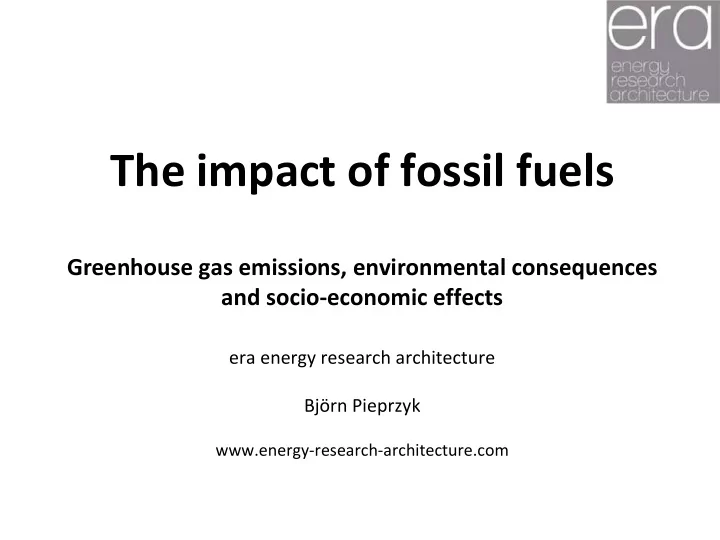

The impact of fossil fuels Greenhouse gas emissions, environmental consequences and socio ‐ economic effects era energy research architecture Björn Pieprzyk www.energy ‐ research ‐ architecture.com
1. Subject of the study • Analysis of conventional and unconventional fuels: – Greenhouse gas emissions – Environmental consequences – Socio ‐ economic effects • Potential of biofuels
1. Subject of the study • Analysis of conventional and unconventional fuels: – Greenhouse gas emissions – Environmental consequences – Socio ‐ economic effects • Potential of biofuels
2. Greenhouse gas emissions of conventional and unconventional fuels What are unconventional fossil fuels? • Complex processing • Fuels from extra ‐ heavy oil, tar sand (bitumen) oil shale, natural gas and coal
3. Methodology • Evaluation of international studies on greenhouse gas emissions of fossil fuels and own calculations based on data of the following institutions: – National Energy Laboratory (USA) – California Environment Protection Agency (CARB) – European Commission Joint Research Centre – University of California Berkeley – World Bank – Jacobs Consultancy (USA) – Oil companies (BP, Talisman, Maersk) – Other institutions (UCG –Undergroud Coal Gasification – Partnership)
4. Main findings: Conventional Oil • Greenhouse gas emissions from conventional oil are on the rise ‐ this results from: – a more intensive use of existing oil fields – deeper oil deposits – heavier oil fields – more sulfur in the oil deposits – huge quantities of flared or vented methane, which is extracted together with the oil
Example: Development of CO 2 ‐ intensity of BP ‐ oil production in the North Sea – increase in 2004 – 2008 of 60 %
Greenhouse gas balance of fossil conventional fuels 229,7 g CO2eq/MJ 129,2 g CO2eq/MJ 83,8 g CO2eq/MJ
5. The production of conventional oil is decreasing and will be balanced by an increase in the production of unconventional oil
6. Greenhouse gas balance of fossil conventional and unconventional fuels 229,7 g CO2eq/MJ 129,2 g CO2eq/MJ 83,8 g CO2eq/MJ
7. Greenhouse gas development in the transport sector Two scenarios: 1.Constant consumption until 2030 2.Consumption increases by 20 % until 2030 Assumptions: • Share of different types of conventional oil based on IEA and University of Uppsala • Share of different types of unconventional oil based on own estimates, which consider the amount of resources and technological development • Average values of our evaluation of GHG ‐ emissions of fossil fuels
7. Greenhouse gas emissions both from conventional and unconventional oil will reach record levels in the future GHG ‐ emissions in transport sector
1. Subject of the study • Analysis of conventional and unconventional fuels: – Greenhouse gas emissions – Environmental consequences – Socio ‐ economic effects • Potential of biofuels
Thank you for your attention! www.energy ‐ research ‐ architecture.com
Recommend
More recommend